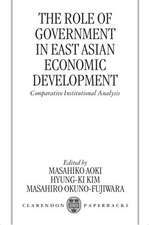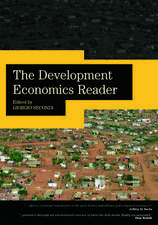The Technological Evolution of Industrial Districts: Economics of Science, Technology and Innovation, cartea 29
Editat de Fiorenza Belussi, Giorgio Gottardi, Enzo Rullanien Limba Engleză Hardback – 30 sep 2003
| Toate formatele și edițiile | Preț | Express |
|---|---|---|
| Paperback (1) | 1228.29 lei 6-8 săpt. | |
| Springer Us – 31 oct 2012 | 1228.29 lei 6-8 săpt. | |
| Hardback (1) | 1233.37 lei 6-8 săpt. | |
| Springer Us – 30 sep 2003 | 1233.37 lei 6-8 săpt. |
Din seria Economics of Science, Technology and Innovation
- 18%
 Preț: 960.93 lei
Preț: 960.93 lei - 18%
 Preț: 951.59 lei
Preț: 951.59 lei - 18%
 Preț: 1219.16 lei
Preț: 1219.16 lei - 18%
 Preț: 1223.43 lei
Preț: 1223.43 lei - 15%
 Preț: 643.84 lei
Preț: 643.84 lei - 15%
 Preț: 640.88 lei
Preț: 640.88 lei - 18%
 Preț: 1225.94 lei
Preț: 1225.94 lei - 18%
 Preț: 1227.36 lei
Preț: 1227.36 lei - 18%
 Preț: 952.72 lei
Preț: 952.72 lei - 15%
 Preț: 643.65 lei
Preț: 643.65 lei - 18%
 Preț: 953.03 lei
Preț: 953.03 lei - 15%
 Preț: 643.00 lei
Preț: 643.00 lei - 18%
 Preț: 944.99 lei
Preț: 944.99 lei - 15%
 Preț: 632.37 lei
Preț: 632.37 lei - 15%
 Preț: 648.24 lei
Preț: 648.24 lei - 18%
 Preț: 947.50 lei
Preț: 947.50 lei - 18%
 Preț: 1233.37 lei
Preț: 1233.37 lei - 18%
 Preț: 948.79 lei
Preț: 948.79 lei - 18%
 Preț: 952.57 lei
Preț: 952.57 lei - 18%
 Preț: 957.44 lei
Preț: 957.44 lei - 18%
 Preț: 942.63 lei
Preț: 942.63 lei - 18%
 Preț: 954.45 lei
Preț: 954.45 lei - 18%
 Preț: 946.24 lei
Preț: 946.24 lei - 18%
 Preț: 953.03 lei
Preț: 953.03 lei
Preț: 1233.37 lei
Preț vechi: 1504.11 lei
-18% Nou
Puncte Express: 1850
Preț estimativ în valută:
235.100€ • 247.07$ • 195.28£
235.100€ • 247.07$ • 195.28£
Carte tipărită la comandă
Livrare economică 05-19 aprilie
Preluare comenzi: 021 569.72.76
Specificații
ISBN-13: 9781402075551
ISBN-10: 1402075553
Pagini: 544
Ilustrații: XXXIII, 502 p.
Dimensiuni: 155 x 235 x 35 mm
Greutate: 0.89 kg
Ediția:2003
Editura: Springer Us
Colecția Springer
Seria Economics of Science, Technology and Innovation
Locul publicării:New York, NY, United States
ISBN-10: 1402075553
Pagini: 544
Ilustrații: XXXIII, 502 p.
Dimensiuni: 155 x 235 x 35 mm
Greutate: 0.89 kg
Ediția:2003
Editura: Springer Us
Colecția Springer
Seria Economics of Science, Technology and Innovation
Locul publicării:New York, NY, United States
Public țintă
ResearchCuprins
1 From the industrial district to the districtualisation of production activity: some considerations.- 2 Local development in a post-Fordist growth regime.- 3 The theory of geographical agglomeration - minimum requirements and a knowledge-based suggestion.- 4 The Industrial District (ID) as a cognitive system.- 5 Why do Ict technologies and the Internet find it hard to spread into industrial districts and favour knowledge exchange.- 6 Cognitive models, efficiency, and discontinuities in the evolution of Industrial Districts and Local Production Systems.- 7 Knowledge creation and codification in Italian Industrial Districts.- 8 Cognitive economies and the “nature of the district”.- 9 Paths of local learning and change in vital industrial districts.- 10 Social identity and identification processes: enriching the theoretical tools to study Industrial Districts.- 11 The industrial district and the “new” Italian economic geography.- 12 Behavioural rules in industrial districts: loyalty, trust, and reputation.- 13 Italian industrial districts: performance and evolution.- 14 Is a district possible in the car industry? The case of the Turin area.- 15 The generation of contextual knowledge through communication processes. The case of the packaging machinery industry in the Bologna district.- 16 The biomedical valley: structural, relational and cognitive aspects.- 17 Sophia-Antipolis as a technopolis phenomenon: is myth becoming reality.- 18 An ecology based interpretation of district “complexification”: the Prato district evolution from 1946 to 1993.- 19 New forms of knowledge creation and diffusion in the industrial district of the provinces of Matera-Bari.- 20 The chair manufacturing district of Manzano: evolutionary processes and the role of the institutions.- 21The role of academic spin-offs in connecting local knowledge.
Recenzii
From the reviews:
"This edited volume[...]represents a painstaking and intellectually challenging effort to set the record straight on the theoretical treatment of IDs and to stimulate new knowledge-centered theoretical venues for further study of the concept and model. However important this book's overall contribution is, I think that Lucio Biggiero and Alessia Sammarra's Chapter 10 contributes its most important argument and stimulus for new research. It provides the skeleton of a new theoretical perspective, which borrows from social psychology's Social Identity Theory to introduce the concepts of district identity and identification. In sum, this volume represents the latest information and most comprehensive collection of works on the subject of IDs. [...]the book has the potential to become a classic and foundational work required for study and research on IDs and on local and regional development especially in the context of the new economy and the knowledge-based industries." (Aspasia Rigopoulou-Melcher, St. Cloud (Minnesota) State University)
"Industrial Districts (IDs) are evolutionary networks of heterogeneous, functionally integrated, specialized and complementary firms, which are clustered into the same territory and within the same industry. … the book includes a good balance between theoretical contributions and empirical-case studies … . this book is a good example of the fruitfulness of knowledge based theories in understanding the evolution of IDs." (Flaminio Squazzoni, Journal of Evolutionary Economics, Vol. 15 (4), 2005)
"This edited volume[...]represents a painstaking and intellectually challenging effort to set the record straight on the theoretical treatment of IDs and to stimulate new knowledge-centered theoretical venues for further study of the concept and model. However important this book's overall contribution is, I think that Lucio Biggiero and Alessia Sammarra's Chapter 10 contributes its most important argument and stimulus for new research. It provides the skeleton of a new theoretical perspective, which borrows from social psychology's Social Identity Theory to introduce the concepts of district identity and identification. In sum, this volume represents the latest information and most comprehensive collection of works on the subject of IDs. [...]the book has the potential to become a classic and foundational work required for study and research on IDs and on local and regional development especially in the context of the new economy and the knowledge-based industries." (Aspasia Rigopoulou-Melcher, St. Cloud (Minnesota) State University)
"Industrial Districts (IDs) are evolutionary networks of heterogeneous, functionally integrated, specialized and complementary firms, which are clustered into the same territory and within the same industry. … the book includes a good balance between theoretical contributions and empirical-case studies … . this book is a good example of the fruitfulness of knowledge based theories in understanding the evolution of IDs." (Flaminio Squazzoni, Journal of Evolutionary Economics, Vol. 15 (4), 2005)















